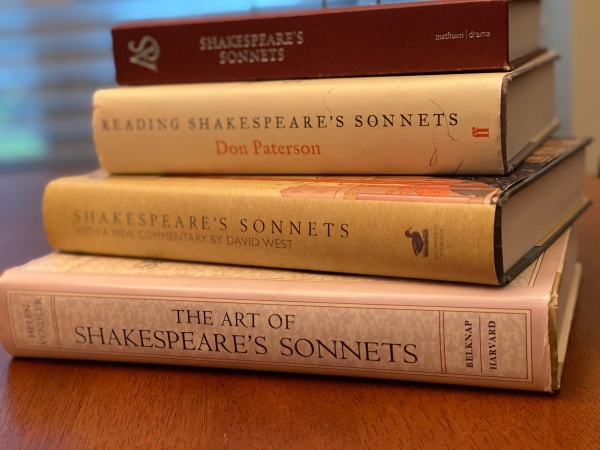 Like many of you, I’ve been reading a lot more lately including some books that have languished in the procrastination pile. One goal has been to read and study one of Shakespeare’s Sonnets a day. They are too rich a diet to ingest more than that especially if one wants to understand them in their historical context and unpack Elizabethan usage and his poetic style. After reading a few, your ear will tune to the syntax. I urge you to read them aloud (all poetry should be read aloud!) and if you want to hear them in a lovely British accent, search for Sir Patrick Stewart’s (Jean-Luc Picard of Star Trek fame) reading of each of them.
Like many of you, I’ve been reading a lot more lately including some books that have languished in the procrastination pile. One goal has been to read and study one of Shakespeare’s Sonnets a day. They are too rich a diet to ingest more than that especially if one wants to understand them in their historical context and unpack Elizabethan usage and his poetic style. After reading a few, your ear will tune to the syntax. I urge you to read them aloud (all poetry should be read aloud!) and if you want to hear them in a lovely British accent, search for Sir Patrick Stewart’s (Jean-Luc Picard of Star Trek fame) reading of each of them.
Here’s an excerpt from David West’s Author’s Note: [The Sonnets are great and glorious poems . . . and they form a continuous drama, almost every poem linked to its neighbours . . . it follows that they should be read in sequence . . . an unimaginably rich experience of love and life.]
My hunt for helpful commentaries turned up 4 authors whose work offered me a range of styles and opinions about The Bard as a brilliant sonneteer who allows the world to see himself as a flawed human being through his poems in that genre.
 Here are the 4 commentaries that I used for studying each sonnet plus another intriguing book about Shakespeare being gay/bisexual and that author’s premise about the young man’s identity. It’s interesting to note that older commentaries are written by scholars whose work is based on the belief that WS is the absent narrator and the speaker in the sonnets is an unknown character created by the dramatist in a non-sequential collection of somewhat connected poems. Their posture seems rooted in an unwillingness to accept that WS was gay/bisexual or that the sonnets are autobiographical. More contemporary authors/scholars are accepting of both as reality—like more contemporary scholars understanding of Emily Dickinson’s sexuality.
Here are the 4 commentaries that I used for studying each sonnet plus another intriguing book about Shakespeare being gay/bisexual and that author’s premise about the young man’s identity. It’s interesting to note that older commentaries are written by scholars whose work is based on the belief that WS is the absent narrator and the speaker in the sonnets is an unknown character created by the dramatist in a non-sequential collection of somewhat connected poems. Their posture seems rooted in an unwillingness to accept that WS was gay/bisexual or that the sonnets are autobiographical. More contemporary authors/scholars are accepting of both as reality—like more contemporary scholars understanding of Emily Dickinson’s sexuality.
Shakespeare’s Sonnets: with a New Commentary by David West (2007). I use this one as my primary reference. He maintains the old school stance on the speaker as an unknown male and WS as merely the dramatist. West’s summaries are excellent.
The Art of Shakespeare’s Sonnets by Helen Vendler (1997) I used this one as a companion to West based on her stellar reputation as a scholar of poetry. Her commentaries are insightful but often quite academic. West refers to her occasionally and sometimes disagrees with her.
Shakespeare’s Sonnets Edited by Katherine Duncan-Jones (1997 & updated 2010) I added this one to my pile because West also refers to her occasionally. She has a well-written introduction of 100 pages about the history and context of the sonnets. Then each sonnet’s commentary is compressed into two insightful pages.
Reading Shakespeare’s Sonnets: A New Commentary by Don Patterson (2010) I only discovered this one recently. He’s in the new-school camp about WS. His commentaries are contemporary and conversational–often using the kind of slang and irreverent humor one would expect sitting with him at Starbucks. I appreciate his freshness.
Naming Thy Name: Crosstalk in Shakespeare’s Sonnets by Elaine Scarry (2017) I stumbled on this book while searching for other commentaries to balance the sexuality debate. Scarry is a brilliant neurobiologist at Yale and has written many books in that field so I gave credibility to her work on this book in spite of many grey-haired white (hetero) guys who poo poo the premise. There are a few places that she seems to get in the weeds, but I could not put the book down right to the last page. She makes the sonnets and more importantly, Shakespeare, as a fascinating and flawed human being, come alive.
Another resource is Jonathan Bate. He’s an amazing (British) scholar of Shakespere, John Clare and most notably Wordsworth which is how I found him. I’m a huge fan of Wordsworth. Bate has now, surprisingly, left England to take a professorship at Arizona State. I have several of his books and go looking for his podcasts because he’s so wonderful to listen to despite being in the grey-haired old-school camp. My next project will be his new book Radical Wordsworth: The Poet Who Changed the World.
Wordsworth, by the way, was a fan of Shakespeare’s Sonnets. In his own sonnet in defense of the form, he wrote, ‘Shakespeare unlocked his own heart . . .’ Indeed.
One thought on “Pandemic Reading Project”
Comments are closed.